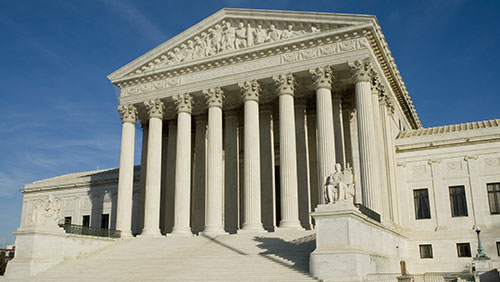This is The Mouthpiece, a guest contribution by Martin Owens. If you would like to submit a contribution please contact Bill Beatty for submission details. Thank you.
What comes after the Murphy decision.
Two hunters, the story goes, once tracked and killed an elephant. One hunter climbed to the top of the great trophy and danced around, waving his arms and shouting “We got i’m! We got ‘im!”
 But the other just leaned wearily on his bow, looked up at the huge carcass and replied, “Yeah, we got ‘im. Now what do we DO with ‘im?”
But the other just leaned wearily on his bow, looked up at the huge carcass and replied, “Yeah, we got ‘im. Now what do we DO with ‘im?”
And this is the problem that confronts the US gambling industry, its operators, service suppliers, professional and amateur sports leagues, and the legislators of 49 states (and five territories) as the verdict in Murphy v NCAA rolls through the gambling world like a shockwave. The victory has at long last been won, and the misbegotten law known as PASPA has been altogether struck down. This is important, and something not to be taken for granted. Many a time, the Supreme Court, presented with what looked like compelling reasons to eliminate a given law or regulation, has merely limited it, or returned the matter for relitigation in the lower courts. There was never a guaranteed slam dunk (though we were all hoping for just that). But does this win in Washington mean a wave of sports betting will roll from coast to coast in a matter of months? Not necessarily. In fact, don’t bet on it.
The first thing to remember is that state gambling law remains the primary focus of gambling law in the USA. There is no such thing as a national gambling license, and not likely to be for the foreseeable future. If an operator wants to offer any kind of gambling to the residents of State X, he needs the permission of State X’s legislature. In fact, while US state governments now have the ability to legalize sports betting if they so wish, there is no requirement that they do so. States like Hawaii and Utah outlaw every sort of gambling, so a ruling regarding sports bets won’t affect their policy or laws anytime soon.
To take it further, there is still no such thing as a right to gamble. This was set down in a previous Supreme Court case, United States v. Edge Broadcasting, wheerin the court states : “[G]”ambling—implicates no constitutionally protected right; rather, it falls into a category of “vice” activity that could be, and frequently has been, banned altogether.’1 That is still valid today.
So that means states have what is called plenary power over matters like gambling. Which means that within very broad limits they can do anything they like with, to, or about it. And while it’s true that a number of states have already passed, or are considering, the enabling legislation that will allow sports betting within their respective borders, that isn’t the end of the story, not by a long way.
In every place that will allow sports betting, there needs to be a regulatory structure, a book of rules lining out who may gamble, and where, and when, and how. New inspectors and administrators would have to be trained and hired. Procedures for regular audits and investigation of customer complaints would have to be written. And of course every bet would have to be comprehensively tracked and recorded, to protect both players and operators (not to mention state revenues). Background checks would have to be conducted on all potential operators and their key employees. Office space would have to be provided, together with support staff like secretaries. An acquaintance in the California Department of Justice told me that even if new gambling were authorized today, it would take anything up to two years for the Golden State to write, revise, and activate the regulatory backbone that is an absolute necessity here. But California has one of the best staffed legislatures in the country. How long it would take smaller states, with part-time legislatures, is anybody’s guess.
 And, of course, that’s assuming that any given state legislature will actually authorize sports betting in the first place. Not everybody thinks it’s a good idea. The strongest opposition to expanding state gambling programs into sporting bets is not offered by evangelists and world savers, but rather by other vested interests in the gambling industry, who see a new format as a potential threat to their own positions. Who gets to take the bets, and where, is every bit as important as whether they can be taken at all. And as usual, where you stand on this issue depends on where you sit.
And, of course, that’s assuming that any given state legislature will actually authorize sports betting in the first place. Not everybody thinks it’s a good idea. The strongest opposition to expanding state gambling programs into sporting bets is not offered by evangelists and world savers, but rather by other vested interests in the gambling industry, who see a new format as a potential threat to their own positions. Who gets to take the bets, and where, is every bit as important as whether they can be taken at all. And as usual, where you stand on this issue depends on where you sit.
In New Jersey, it is pretty much understood that sports betting will only be allowed in the already licensed premises, including the racetracks. This is acceptable to everybody there, because there are essentially, no other parties.
At the other end of the continent it is far otherwise. No less than 110 of America’s 500-plus recognized Indian tribes live in California. Golden State Indians muster about 69 casinos operating under the Indian Gaming Act of 1988. This includes huge, almost Vegas-scale resorts such as Palm Springs and Thunder Valley, as well as smaller, more locally focused operations. Competing with them for the gambling dollar are about 90 remaining license municipal card rooms. State authorities have allowed the card rooms to accommodate what are called third-party proposition player (TPPP) banking firms. Working with them, cardrooms can offer banked games such as blackjack and Pai Gow. The card rooms insist they need these to compete with the Indian operations, which have already walked off with most of their clientele.
But the Indians are convinced that granting the card rooms any sort of banked game violates the California Constitution, particularly the amendment that allowed only Indian tribes to offer “casino style gambling”. As far as they are concerned, the state government, by allowing banked games to the card rooms, is double-crossing the red man yet again. And this time around they have the financial muscle and political wallop to make their displeasure felt. The tribes have blocked the authorization of Internet poker in California, for one reason or another, for the past ten years. And they have made it more than clear that they will do the same to sports betting if the inmates of the Sacramento State House don’t (as they see it) come around and do the right thing.2
Many other states present the same picture, in various iterations. It all comes down to the same thing: vested gaming interests competing for the same dollar. Desperately trying not to lose customers, and intensely interested in the possibility of a new format – so long as they get sole and exclusive control of it, that is.
JURISDICTION VS MONEY
And now we come to the closely related problems of jurisdiction and liquidity. Liquidity comes first, because it means money. Specifically, when we talk about liquidity in the gaming context, we are talking about whether a worthwhile paying audience can be drummed up to play a given game or make a given bet, so much so that offering that bet or game is a paying proposition in the long term. In most US states, the answer is no, it isn’t. Let’s take the example of Internet poker in the three states where it has been approved: Delaware, New Jersey, and Nevada. Most of the players of those offered games are not pro gamblers. They play in their spare time. So the pattern of activity is as follows: from quitting time at 5 PM to about midnight is the peak traffic, as people come home from work and unwind with leisure pursuits. There are a few night owls, steadily diminishing until the sun comes up. Then it’s time to go to work, and only a few can squeeze in a game while commuting. Obviously, people are not permitted to gamble on company time (unless you work for certain departments of the Federal government, where they are glad to see you playing poker instead of dialing up porno sites.) Perhaps a few games can be squeezed in over the lunch break, but the silence of the desert descends until the end of the working day, when the cycle starts once again. The schedule is full of what a broadcaster would call “dead air”. And the dead air is unprofitable.
 And this is why the gray area, pirate-island outfits make money on poker and casino games where the licensed operations don’t seem to be able to. The gray people understand that gambling has gone online, and digital, and thereby become a global market, operating 24/7 and also needing to generate a profit 24/7. Is nobody playing in New York at 11 PM? With global reach you can take in the late night crowd in San Francisco, the noontime players in Sydney, early birds in the Middle East. An online operation means you don’t need to have a physical presence in these places, which cuts the overhead down to practically nothing. Distance and location don’t matter anymore, and thus we can construct what is called “The Long Tail” – that is, leveraging online presence to assemble a market online, which would be impossible in the brick-and mortar-world.
And this is why the gray area, pirate-island outfits make money on poker and casino games where the licensed operations don’t seem to be able to. The gray people understand that gambling has gone online, and digital, and thereby become a global market, operating 24/7 and also needing to generate a profit 24/7. Is nobody playing in New York at 11 PM? With global reach you can take in the late night crowd in San Francisco, the noontime players in Sydney, early birds in the Middle East. An online operation means you don’t need to have a physical presence in these places, which cuts the overhead down to practically nothing. Distance and location don’t matter anymore, and thus we can construct what is called “The Long Tail” – that is, leveraging online presence to assemble a market online, which would be impossible in the brick-and mortar-world.
But there remains the problem of jurisdiction- that is who’s in charge? Of course a given state doesn’t want outsiders in its market, but the liquidity problem makes it almost imperative to reach beyond the state borders. The obvious solution is to share jurisdictions- i.e. groups of states with similar gambling programs (particularly online) agree to pool their clientele.
New Jersey, Nevada, and Delaware, the only three US states now offering online poker, agreed to this step recently. But sports betting is a more complicated beast, with sets of interlocking problems and mutually competitive stakeholders.
We will be addressing these problems and interrelationships specifically, and in more detail,in subsequent installments.
1 509 U.S. 418, 426, 113 S. Ct. 2696, 2703, 125 L. Ed. 2d 345 (1993), citing Posadas de Puerto Rico Associates v. Tourism Co. of P.R., 478 U.S. 328, 106 S.Ct. 2968, 92 L.Ed.2d 266 (1986),
2 See, e.g .Dave Palermo,”Tribes Take Shots At California Cardrooms, Regulators At Conference About Sports Betting, Expanded Gaming”, Online Poker Report, February 18, 2018 at https://www.onlinepokerreport.com/28961/tribes-vs-cardrooms-and-regulators-in-california/
Mr. Owens is a California attorney specializing in the law of Internet and interactive gaming since 1998. Co-author of INTERNET GAMING LAW with Professor Nelson Rose, ( Mary Ann Liebert Publishers , 2nd ed 2009); Associate Editor, Gaming Law Review & Economics; Contributing Editor, TSN. Comments/inquiries welcome at [email protected].